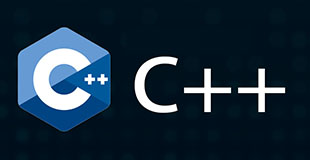
C++ Programming
Description
C could be a pleasant, powerful, and versatile programming language. several of the modern languages like C++, Visual C++, JavaScript, Java, etc. are supported C Language. If we don't understand this Language is considered to be a handicap. the fundamental types are characters, and integers and floating-point numbers of many sizes. Pointers give for machine independent address arithmetic
C++ Programming-Course content
- Standard Libraries
- The ANSI Standard
- Learning C++
- Try it Option Online
- C++ Program Structure
- Compile & Execute C++ Program
- Semicolons & Blocks in C++
- C++ Keywords
- COMMENTS IN C++
- Primitive Built-in Types
- Typedef Declarations
- Enumerated Types
- Variable Definition in C++
- Variable Declaration in C++
- Lvalues and Rvalues
- Local Variables
- Global Variables
- Initializing Local and Global Variables
- Integer Literals
- Floating-point Literals
- Boolean Literals
- Character Literals
- String Literals
- Defining Constants
- Type Qualifiers in C++
- The auto Storage Class
- The register Storage Class
- The static Storage Class
- The extern Storage Class
- The mutable Storage Class
- Arithmetic Operators
- Relational Operators
- Logical Operators
- Bitwise Operators
- Assignment Operators
- Misc Operators
- Operators Precedence in C++
- While Loop
- Loop Control Statements
- The Infinite Loop
- If Statement
- if…else Statement
- if...else if...else Statement
- Switch Statement
- Nested if Statement
- The ? : Operator
- Defining a Function
- Function Declarations
- Calling a Function
- Function Arguments
- Defining Numbers in C++
- Math Operations in C++
- Random Numbers in C++
- Declaring Arrays
- Initializing Arrays
- Accessing Array Elements
- Arrays in C++
- Passing Arrays to Functions
- The C-Style Character String
- The String Class in C++
- What are Pointers?
- Using Pointers in C++
- Pointers in C++
- Null Pointers
- Pointer Arithmetic
- Pointers vs Arrays
- Array of Pointers
- Pointer to a Pointer
- Passing Pointers to Functions
- Return Pointer from Functions
- References vs Pointers
- Creating References in C++
- References as Parameters
- Reference as Return Value
- Current Date and Time
- Format Time using struct tm
- I/O Library Header Files
- The Standard Output Stream (cout)
- The Standard Input Stream (cin)
- The Standard Error Stream (cerr)
- The Standard Log Stream (clog)
- Defining a Structure
- Accessing Structure Members
- Structures as Function Arguments
- Pointers to Structures
- C++ Class Definitions
- Define C++ Objects
- Classes & Objects in Detail
- Class Access Modifiers
- The public Members
- The private Members
- The protected Members
- Constructor & Destructor
- Friend Functions
- Inline Functions
- this Pointer
- Pointer to C++ Classes
- Static Members of a Class
- Static Function Members
- Base & Derived Classes
- Access Control and Inheritance
- Type of Inheritance
- Multiple Inheritance
- Function Overloading in C++
- Overloadable/Non-overloadable Operators
- Operator Overloading Examples
- Unary Operators Overloading
- Increment (++) and Decrement (- -) Operators
- Binary Operators Overloading
- Relational Operators Overloading
- Input/Output Operators Overloading
- ++ and - - Operators Overloading
- Assignment Operators Overloading
- Function Call () Operator Overloading
- Subscripting [ ] Operator Overloading
- Class Member Access Operator - > Overloading
- Virtual Function
- Access Labels Enforce Abstraction
- Access Labels Enforce Abstraction
- Data Encapsulation
- Interfaces
- Opening a File
- Closing a File
- Writing to a File
- File Position Pointers
- Throwing Exceptions
- Catching Exceptions
- C++ Standard Exceptions
- Define New Exceptions
- The new and delete Operators
- Dynamic Memory Allocation for Arrays
- Dynamic Memory Allocation for Objects
- Defining a Namespace
- The using directive
- Discontiguous Namespaces
- Nested Namespaces
- The #define Preprocessor
- Function-Like Macros
- Conditional Compilation
- The # and # # Operators
- Predefined C++ Macros
- The signal() Function
- The raise() Function
- Creating Threads
- Terminating Threads
- Passing Arguments to Threads
- Joining and Detaching Threads
- What is CGI?
- Web Browsing
- CGI Architecture Diagram
- Web Server Configuration
- HTTP Header
- CGI Environment Variables
- C++ CGI Library
- GET and POST Methods
- Using Cookies in CGI
- The Standard Function Library
Courses Features
-
LanguageEnglish
-
Lectures03
-
CertificationYes
-
Project01
-
Duration30 hrs
-
Max-Students20


